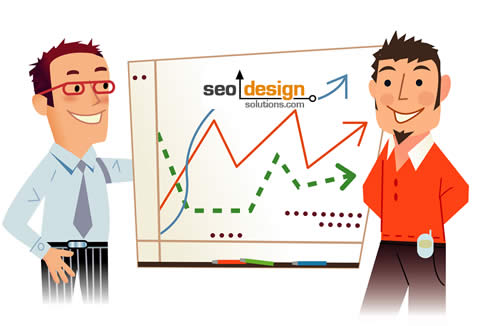If you understand the psychology of supply and demand, search engine positioning and more importantly what consumers want, you can devour entire markets as a result of superior SEO and tactical strategic execution.

What SEO can Do For Your Business
The often aloof sense of causation that beckons consumers to spend is the driving force of commerce. Learning to speak the language (of search, point and click) , understand its cues and leverage causes that create effects places the power of search at your fingertips as a genuine game changer for your business.
While there may be a significant percentage of people that are susceptible to impulse purchases from navigational surfing (tangential happenstance – right place right time) on the contrary, by the time someone conducts a search to make a purchase online, 90% of those people already know what they want – and the search engine is a merely a “means to an end”.
Why is SEO is Important for Your Business
Referring to the 90% of consumers that know what they want when they open their browser and set out to find it, the purpose of SEO is to reach them first when the the impulse to purchase is strongest.
There is no substitute for the moment a prospect transforms from an information forager and evolves into the purchasing mindset. When this switch in consumer behavior occurs daily – for millions of people and millions of products and services – where you rank in search engines and how well your offer delivers what they are searching for directly impacts your business.
First Come, First Serve
If you can occupy the coveted top 3 positions for a keyword that corresponds to the descriptive phrases, synonyms and/or modifiers that someone would use to find the desired product or service then that website can garner a significant amount of traffic (based on the premise of supply and demand) and more importantly search engine positioning.
According to statistical analysis, the #1 position gets an estimated 40% or higher click through rate in search engines and the #10 position roughly receives 2% of the click through rate for a given keyword.
As suggested – first come, first serve is more than just a cliché – it’s a functional directive of search, and those who occupy those top 3 spots can validate this claim.
What Does this Mean to You and Why Should you Care?
Think about the last purchase you made online, did you go to page 2, page 3 or beyond or did you just do what most people do, click the top result? As the psychology of search suggests 91% of most consumers do not search past page 1. Under the same logic, if a website is #1 for my keyword – they must have the most relevant website for my query, right?
While this may not always be the case, it is the law of the land and if you understand relevance, scalability, conversion and how search engines work, then ranking for virtually any keyword in any market is only (a) a matter of resource (b) a matter of popularity and citation (which typically involves content, promotion and links and (c) a matter of time – before keywords start to appear on the horizon.
While managing expectations during this process is critical “so you don’t give up before arriving triumphant in the top 10”. In all honesty, most people succumb to the anxiety of conditional instability as a result of allowing their attention to settle on the wrong metrics when assessing the status of an SEO campaign.
Search results are predicated on trust and trust is not something which you can create overnight. Before your website can push competitors aside, it must first pass a battery of algorithmic inquiries to test its mettle for the top 10.
Why Trust Matters More than Rankings
Trust is the reason why pages rank the way they do. When developing trust 3 things are critical (1) on page optimization (including canonicalization, creating a preferential internal link structure, removing all 404 errors or canonical errors) (2) implementing staggered topical content and (3) the introduction and eventual scaling of link / citation from other websites to solidify peer review from other online sources to validate your position.
While the stages (1,2 and 3 above) may be performed quickly; trust takes time “to gel” in search engines before reaching the sweet spot where a website can rank on a fraction of the on page or off page equivalents of competitors.
This is and always should be the basis of any successful SEO service, not how many keywords you rank for or where they are as much as knowing what to rank for and why.
There is a method to SEO that transcends the outward manifestations, touching on that value and understanding how to cultivate it (any any website, market, industry or niche) is what separates the novice who has a bottom-up view of the web (acquiring one keyword) vs. a top-down approach (devouring every relevant keyword systematically as a byproduct of content, links and citation).
If you can position your website as an authority (provide impeccable content, value, service and appeal) while simultaneously segmenting landing pages for conversion, then creating the staging area for conversion through traffic generation can yield favorable results as your website gains enough trust to reach those top 3 positions.
Think keyword clusters instead of keywords, by spreading the net across a broader array of synonyms, modifiers and stemmed keyword variants you can drive more traffic to your top converting pages – of you can appeal to the 90% of the searchers who already know what they want.
The question is, do you know what they want and are you optimized for those keywords? If not, it’s never too late – but the longer you wait, the more competition, time and resources it will take to acquire superior search engine positioning.












It’s not often that an article I find on the web becomes a valuable asset, but this one is just that. The information here is important, easy to understand, and up to date. Kudos to a writer I’ll be following in the future.
Josefina Argüello / alta en Google
Josefina Argüello, You are right! if you buy custom term paper? they give you the true information too!
Every business with an online presence should make Search Engine Optimization a top priority. At its most basic level SEO means utilizing techniques that will boost your rankings in the SERPs (search engine results pages) so you will get more visitors to your website.